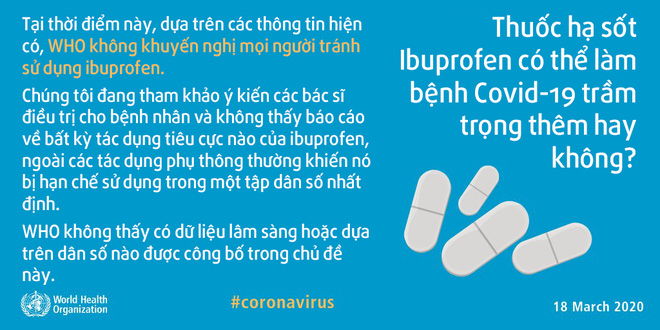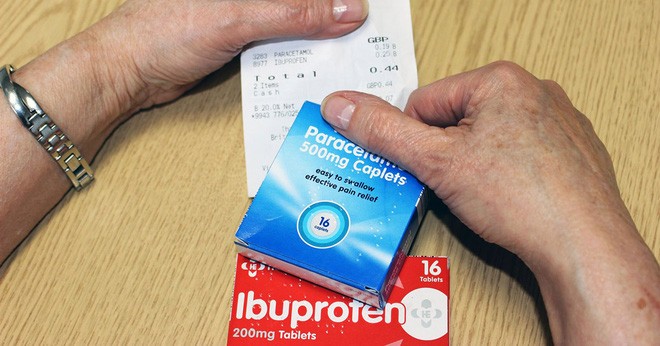WHO abruptly withdraws its advice that people avoid ibuprofen antipyretics for Covid-19
The World Health Organization (WHO) today has just released a new advice regarding ibuprofen, the popular anti-inflammatory antipyretic drug. " At this time, based on existing information, WHO does not recommend people to avoid ibuprofen, " a photo posted on the official WHO Twitter account explained:

The new recommendation contradicts the WHO spokesperson's statement on Tuesday, saying that people should give preference to paracetamol when they have symptoms similar to Covid-19 infection, specifically fever - physical. This is because a study published in the Lancet Medical Journal warned that ibuprofen antipyretics may worsen the disease.
After Tuesday's statement, the WHO faced a lot of mixed opinions, from ibuprofen pharmaceutical companies and a number of doctors and medical experts.
Reckitt Benckiser, a British pharmaceutical company that produces ibuprofen under the Nurofen brand, said it was aware of concerns about "the use of steroids and nonsteroidal anti-inflammatory products (NSAIDs), including ibuprofen, to reduce COVID-19 symptoms ".
However, the drug company emphasizes that " ibuprofen is a good medicine and for over 30 years it has been safely used as a self-reliever and analgesic, even in viral diseases." .
" We currently do not believe that there is any proven scientific evidence related to the use of over-the-counter ibuprofen that aggravates Covid-19, " the statement said.
The spokesman said Reckitt Benckiser had "joined the WHO, EMA (European Health Agency) and other local health authorities" to address these concerns, and will provide "all information." or necessary instructions so people can safely use our products. "

The most inconsistent backyard
It is unclear whether WHO has worked with Reckitt Benckiser or not, but in their latest announcement they wrote:
" WHO is aware of concerns about the use of #ibuprofen in the treatment of fever for people with # COVID19. We are consulting doctors treating patients and not seeing any reports of any What are the negative effects of ibuprofen, in addition to the common side effects that limit it to use in a given population? "
The contradictory recommendations for ibuprofen and Covid-19 were sparked by a study in the Lancet medical journal. In it, the authors hypothesized that anti-inflammatory drugs such as ibuprofen may enhance an enzyme, and this enzyme could exacerbate Covid-19 disease.
Later, French Health Minister Olivier Véran, in turn, tweeted that the use of anti-inflammatory drugs such as ibuprofen and cortisone could worsen Covid-19.
" In case you have a fever, take paracetamol," wrote Olivier Véran.
Linking up this line of opposition against ibuprofen, WHO spokesman Christian Lindmeier said yesterday: WHO is learning more about the issue."During that time, we recommend paracetamol antipyretics and do not arbitrarily use ibuprofen. This is a very important note," Lindmeier said.

"In case you have a fever, take paracetamol," said Health Minister Olivier Véran.
A controversial issue, as there is no medical evidence
Some doctors have reported whether or not the problem, whether or not ibuprofen should be given to Covid-19 patients, needs to be clarified. " I have not seen any study specifically indicating ibuprofen increases the risk of Covid-19 complications ," said Dr. Eudene Harry, medical director at Oasis Wellness & Rejuvenation Center, USA.
But there is a logic behind the recommendations not to use it. " A good reason to avoid ibuprofen is because it can exacerbate acute kidney damage, but is due to any disease, not just Covid-19," said Dr. Harry. .
" Physicians may recommend that patients use paracetamol instead of nonsteroidal anti-inflammatory products (NSAIDs) such as ibuprofen if the patient has Covid-19 with other underlying conditions . "
In fact, patients with Covid-19 who already have cardiovascular disease, diabetes, cancer or other chronic conditions such as kidney disease still have a higher risk of complications.
Agreeing with this logic, Ian Jones, a virologist at the University of Reading, UK, explained: "The recommendation regarding the anti-inflammatory properties of Ibuprofen is that it may weaken the immune system, from which slows the patient's recovery. "
This has been noted in several studies of other non-corona virus strains but also causes pneumonia."Ibuprofen aggravates these cases, while paracetamol does not ," Jones said. " People should use paracetamol to reduce the temperature if you have a fever."
"In the UK, paracetamol is often preferred over nonsteroidal anti-inflammatory drugs such as ibuprofen, when it is necessary to reduce symptoms of infection such as fever," said Dr. Tom Wingfield, Senior Clinical Lecturer and Consultant Physician. attending the Liverpool School of Tropical Medicine agrees.
That's because paracetamol is less likely to cause side effects such as stomach irritation and kidney damage, especially when taken for a long time and when taken as directed by your doctor. (However, some people, such as heavy drinkers or those with liver disease, should not use paracetamol because it can cause liver damage when overdosed.)

However, not all experts agree that paracetamol should be the only option for people with Covid-19. Ernest Brown, a British doctor who founded Doctors to You 's home doctor service, said his support for paracetamol and avoiding ibuprofen were now based solely on logic, not on medical evidence.
"I want to see the evidence before making conclusions about ibuprofen ," he said. Agreeing with this, Dr. Harry said Covid-19 is a very new disease, we need more time to conduct extensive research on it, including examining the effect of ibuprofen on Bad progression or worsening transformation in the patient.
While waiting for the evidence, it is best to have Covid-19 symptoms, you should contact your doctor. The treating doctor will be the last person to give you professional advice, including the medication you are taking.
Christian Lindmeier, a WHO spokesperson also said, if the doctor had prescribed ibuprofen to the patient, then of course, it was their decision [after taking into consideration all possible risk factors and complications. for the patient].
Refer to Businessinsider
You should read it
- ★ This AI 'doctor' is being used to quickly diagnose Corona virus
- ★ Rumors regarding the new Corona virus (2019-nCoV) and WHO answers
- ★ USA: Cancel the conference about the corona virus because of the corona virus
- ★ [Infographic] 13 false rumors about corona virus: WHO explains why they are all unscientific
- ★ Why is AI the leading effective weapon in the fight against COVID-19?